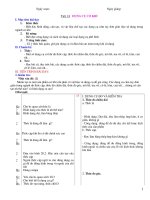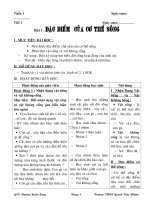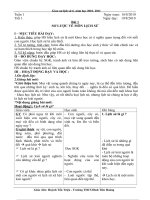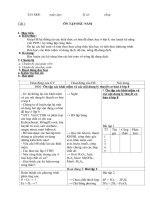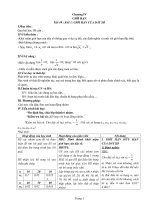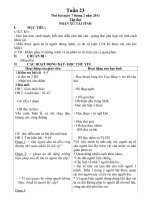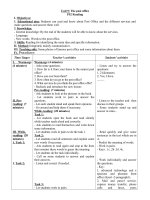Bài soạn giao an 8 ky II chuan 2011
Bạn đang xem bản rút gọn của tài liệu. Xem và tải ngay bản đầy đủ của tài liệu tại đây (711.74 KB, 154 trang )
Sơn Hà secodary school
/Unit 8: Country life and city life
Period 2/47: Speak
A. Aim: By the end of the lesson, students will be able to practice
speaking about the differences in town now and in the past.
Teaching aids: - posters, a picture.
Anticipated problems:
B. Content:
I. Warmer: - Greetings
* Brainstorm:
Tell me adjectives you’ve learned? strong
long
tall
beautiful
II. Pre- speaking: fat
- Present the dialogue between Hoa and Na:
Hoa: Have you ------ (1) ------- away?
Na: I went to ----- (2) ------ for the ------- (3) ------
Hoa: How ------- (4) ------- it now?
Na: It is getting more ------ (5) -------
- T reads the dialogue out loud.
- Ask them to write down the missing words in their notebooks.
- Ask ss to go to the board and fill in.
- Underline sentence: It is getting more beautiful.
- Pronunciation practice: Jazz Chant using the short adjectives ss
generated.
- Model: The strong are getting stronger.
The rich are getting ------.
- Ss use the adjectives above to chant.
- Ask ss to read out.
- Hang on the pictures on board.
- Let ss to look at them to talk about the things that are changing in town
using the words in the box.
- Run through the words in the box.
III. While-speaking:
- Get ss to work in pairs.
- Ask ss to write on board.
- Check as a whole class. Ask ss if the changes are a good thing or a bad
thing and then label them with faces.
Ex: + The streets are getting dirtier.
GV dạy : Nguyễn Thị Hồng
Adjectives
Sơn Hà secodary school
+ The building are getting more beautiful.
IV. Post-speaking:
- Ask ss to work in groups and talk about changes in their hometown/
neighborhood.
- Call on volunteer from each group to show their ideas before the class.
Other groups can add in their ideas.
- T corrects mistakes.
V. Homework:
- Prepare for Unit 8: Listen.
VI. Remarks:
* Answer key:
(1). been (2). Kim Lien (3). weekend (4). is (5). beautiful
- The traffic is getting busier.
- There are more tall buildings and houses.
- The houses are getting more modern.
- The town is becoming more beautiful.
- There are more green trees.
- The streets are more becoming cleaner/ larger/ noiser.
- Goods are getting more expensive.
GV dạy : Nguyễn Thị Hồng
Sơn Hà secodary school
Period 45 Date 11/12/2009
Unit 8: Country life and city life
Lesson 2: Listen + Speak
A. Aim: By the end of the lesson, students will be able to complete the dialogue
by listening and practice speaking about the differences in town now
and in the past
Teaching aids: - posters, a picture, tape.
Way of working: pairs and group work
B. Content:
I. Warmer: Brainstorm:
Tell me adjectives you’ve learned? strong
long
tall
beautiful
I. Pre-listening:
- Let ss to look at the picture then guess what are they talking about on the phone.
- Have ss to look at the dialogue between them on p. 74 - read and find the words
to fill in the dialogue.
- Ask ss to guess.
- Write ss’ guess on board.
II. While-listening - Get ss to listen to the tape then check.
- Open the tape (twice)
- Ask ss to share with their friends.
- Ask ss to go to board and fill in.
- Open tape one more time.
- Ss listen again to check
Answer key:
1/ that 2/ this 3/ It’s 4/ Where 5/ from 6/ coming 7/ next week
8/ arriving 9/ Thursday 10/ late11/ afternoon 12/ speak 13/ my14/ get
III. Pre- speaking: fat
- Present the dialogue between Hoa and Na:
Hoa: Have you ------ (1) ------- away?
Na: I went to ----- (2) ------ for the ------- (3) ------
Hoa: How ------- (4) ------- it now?
Na: It is getting more ------ (5) -------
- T reads the dialogue out loud.
- Ask them to write down the missing words in their notebooks.
- Ask ss to go to the board and fill in.
Answer key:(1).been (2). Kim Lien (3). weekend (4).is (5). beautiful
- Underline sentence: It is getting more beautiful.
GV dạy : Nguyễn Thị Hồng
Adjectives
adjective
Sơn Hà secodary school
Form s + is/am/are + Getting/ Becoming + Ajd
Word cues drill: a. The boy/get/ tall b.The old man/become/weak
c. The weather/ get/ cold d. The ss/become/ better
Call ss to say out before the class
- Hang on the pictures on board.
- Let ss to look at them to talk about the things that are changing in town using the
words in the box.
- Run through the words in the box.
IV . While-speaking:
- Get ss to work in pairs.
- Ask ss to write on board.
T models:
Ex: + The streets are getting dirtier.
+ The building are getting more beautiful.
- Ask ss to write on board.
Answer key
- The traffic is getting busier.
- There are more tall buildings and houses.
- The houses are getting more modern.
- The town is becoming more beautiful.
- There are more green trees.
- The streets are more becoming cleaner/ larger/ noiser.
- Goods are getting more expensive.
V. Post-speaking:
- Ask ss to work in groups and talk about changes in their hometown/
neighborhood.
- Call on volunteer from each group to show their ideas before the class. Other
groups can add in their ideas.
- T corrects mistakes.
Possible answer: The houses are becoming more modern
The hospital is getting larger
The streets aregetting busier
V. Homework: - Do exercise 1, 5
GV dạy : Nguyễn Thị Hồng
Sn H secodary school
Period 46 Date 14/12/2009
Unit 8: Country life and city life
Lesson 3 Reading
A. Aim: By the end of the lesson, students will be able to understand the text
about one of the social problems.
Teaching aids: - posters.
Ways of working: individual and pairs work
B. Content:
Warmer: - Greetings
- Jumbledwords:
- Write the words with disordered letters on the poster.
- Devide class into 2 teams and ask ss each team to go to board and write correct
words.
- The team which is faster with more correct words wins the game.
+ fulentipl -> plentiful + laputipoon -> population
+ taneru -> nature + viroped -> provide
+ loofd -> flood + suertl -> result
+ roestdy -> destroy + ciliestiaf -> facilities
I. Pre-reading:
1. Vocabulary:
- rural (adj): thuộc nông thôn (example)
- urban (adj): thuộc đô thị, thành phố (antonym)
- typhoon (n): trận bão lớn (situation)
- drought (n): nạn hạn hán (explanation)
- strain (n): sự quá tải (dân số) (translation)
- (to) struggle: đấu tranh (translation)
- migrant(n) dân di c ( explaination)
- (to) increase tăng lên (trans.)
Checking vocabulary: What and where.
2. Brainstorming:
- Ask ss to think of the dificulties of farmerslife.
typhoon
floods
get little money
- Ask ss to guess how farmers deal with difficulties.
- Get ss to work in groups of four to guess.
II. While-reading:
GV dy : Nguyn Th Hng
difficulties of
farmerslife
Sơn Hà secodary school
1. Checking ss’guess:
- Let ss look at the text on p.75 read silently and check.
Possible answer:
- droughts - hard work - no vacation
- lack of clean water/ electricity - insects destroy harvests
- flood - get little money
* Ask them a question:
- What do many farmers do to solve their problem?
They move to the city so that they can get well-paid jobs.
2. Gap fill:
- Ask ss to read the text again to complete summary 1 on p.75, using the
information from the passage.
- Work individually.
- Ask them to compare with their friends.
- Call ss to write the answer on board.
- Let ss look at the answer to correct.
Answer key:
(1) leaving (4) rural (7) schools (10) world
(2) home (5) city (8) hospitals
(3) city (6) problems (9) problem
3. Finding the words:
- Hang on the poster about the phrase words on p. 75 on board.
- Let ss to look at them and run through.
- Ask ss to read the text again to find the word in the passage that means.
- Have ss to share with their friends.
- Call ss to go to board and write.
- T correct.
Answer key:
a/ rural d/ strain
b/ plentiful e/ tragedy
c/ increase f/ urban
III. Post-reading:
* Discussion:
- Give ss a situation: If you were a Minister, what would you do for farmers?
- Work in group of six people.
- Ask ss to say before the class
Possible answer: - Build streets, stadium, theater
- Build school, hospital, medical facilities
- Provide clean water, electricity,.........
- Build traditional job villages to give more work to the farmers
IV. Homework:
- Prepare for Unit 8: Write
- Learn new words + Do ex. 4, in workbook.
GV dạy : Nguyễn Thị Hồng
Sơn Hà secodary school
Period 47 Date 15/12/2009
Unit 8 Country life and city life
Lesson 4: Write
A. Aim: By the end of the lesson, students will be able to write letters to their
friends about their neighborhood.
Teaching aids: - posters.
Ways of working: individual and pairs work
B. Content:
Warmer: - Greetings
-Chatting:
. Wheredo you live?
. How far is it from your house to school?
. How do you get to school?
. What are there in your neighborhood ?
( What can you do there?)
SS answer
To day we learn Unit 8: Lesson 4: Write
I. Pre writing:
1.Matching:
T hangs the poster of the letter on the board
T asks ss to read before the class - T corrects the mistakes
Then T asks ss to come to the board and match the outline for an informal letter
with the part of the letter
1*50 Le hong phong street
HCM city
December 9 2009
Dear Mai
2*I'm writing to you to tell about my neighborhood
3*We have just moved into a newapartment on the ninth floor in the center of HCM
city. It is wonderful to see the city at night from the window of my room.
It is convenient here because there is a supermarket, a small postoffice, a drug store
and a book store on the ground.
Every day I go to school by bus, and It's very quick and cheap.
Write to me soon and tell me all your news
4*Regards
Hoa
1. Heading
- Writer’s address.
- Date
- Dear....,
2. Opening
GV dạy : Nguyễn Thị Hồng
Sơn Hà secodary school
3. Body of the letter
4. Clothing
T corrects and asks :How many parts are there in an informal letter? What
are they?
SS answer :
SS read insilent the letter (2') then answer quick questions:
* Quick questions:
a. Where is the writer? (Hoa)
b. What does Hoa write about in the letter? ( her neighborhood)
c. What can Hoa see from the window of her room?( the city)
d. What are there in her neighborhood?( a supermarket.... a book store)
e. Howdoes Hoa go to school?( by bus)
II. While-writing: Now you have to write a letter to a friend about your
neighborhood
- Ask ss to work in pairs to answer the questions in ex.2 on p.76.
- Give feedback.
Where do you live?
- I live in a small town/ big city/ village.
What does your house look like?
- ( It is very nice with four rooms: living room, kitchen, my parents's room and my
room
What can you see from your bedroom window?
- From my bedroom window, I can see a small yard with many green trees and
colorful flowers.
How far is it from your house to school?
- We don't live far from my school so I can walk
What kinds of facilities are there in your neighborhood?
- There is a small stadium, apost office, a library , a drug store,some restaurants
What things in your neighborhood do you like best? why?
- I like the library best beacause I can read books and newspapers
- Ask ss to write letter to friends about their neighborhood.
- Ss using the questions to help them write a letter.
- Let them write individually.
- Ask them to share with their friends and correct if they can.
- Call ss to read out the letter.
III. Post-writing:
- Ask 3 ss to write the letters on board.
- Let ss to look at them then find the mistakes and correct them.
- Help ss to correct mistakes. * Answer key:
Suggested letter:
(Write address)
(date)
Dear .....,
I'm writing to you to tell about my neighborhood .
I live in a small village. My house isnot big
with four rooms: living room, kitchen, my parents's room ,my room
GV dạy : Nguyễn Thị Hồng
Sơn Hà secodary school
and a big garden. From my bedroom window I can see a small yard with green
trees, flowers and a lake. We don’t live far from my school so I usually walk there.
In my neighborhood, there is a small stadium, a small post office and a public
library and drug store. But the thing I like best in my neighborhood is the public
library near my school. There I can study , read books , watch video and learn
how to use the computer.
Do you have a library like that in your neighborhood? Is there anything interesting
in the place where you live? Write to me soon and tell meall your news.
Love,
(Signature)
IV. Homework:
- Finishing writing the letter at home
- Prepare for Unit 8: Language focus
GV dạy : Nguyễn Thị Hồng
Sơn Hà secodary school
Period 48 Date 19/12/2009
Unit 8: Country life and city life
Lesson 5 : Language focus
A. Aim: By the end of the lesson, students will be able to use comparative and
superlative adjectives and further practice in present progressive tense
to talk about the future.
- Teaching aids: - posters.
- Ways of working: individual and pairs work
B. Content:
Warmer: - Greetings
* Brainstormming:
- Ask ss to find out short adjectives and long adjectives they have learned?
- Get ss to go to the board and write the adjectives.
beautiful
tall
I. Comparative and superlative adjectives:
1. Form:
- Remind ss of the forms of comparative and superlative adjectives.
* Activity one: comparative adjectives
+) form: short adjective-er + than + objective
more long adjective + than + objective
? Ex: - Lan is taller than Mai.
- Hanoi is more beautiful than Vinh.
* Activity two: superlative adjectives
+) form: the short adjective – EST
the most + long adjective
? Ex: - Ba is the biggest in our class.
- Ho Chi Minh is the most expensive city in Vietnam.
Note: Irregular adjectives:
- good/ well -> better -> the best
- bad -> worse -> the worst
- many -> more -> the most
- little -> less -> the least
2. Practice:
1. Exercise 4: p.79
- Hang on the words on a poster.
- Run through the words
GV dạy : Nguyễn Thị Hồng
long adjectives
short adjectives
Sơn Hà secodary school
- Have ss to look at the words to make comparision between the city and the
country.
- Give a model: - The air in the country is fresher than in the city.
- Work in pairs
- Let each student read aloud one of the sentence they have made.
* Answer key:
1/ The food in the city is more expensive than in the country.
2/ The school in the city is better than in the country.
3/ The traffic in the city is busier than in the country.
4/ The entertainment in the country is poorer than in the city.
5/ The transport in the country is worse than in the city.
2. Exercise5: p.79
- Have ss to look at advertisements then compare the house, villa and the apartment.
- Run through advertisements and adjectives.
? What are advertised? – an apartment, a villa and a house.
? How old are they? – The apartment is 2 years old, the villa is 5 years old and
the house is new
- Devide class in two teams and ask them to play Noughts and Crosses. One team is
Noughts (O) and the other is Crooses (X).
- Two teams choose the words in the boxes in turn then use the coparative or
superlative.
If the sentence is correct, they will get one mark. The team which has three (O) or
(X) on a line will win the game
old (1) expensive (2) big (3)
expensive (4 small (5) hot (6
big (7) beautiful (8 old (9)
- Modal: - The villa is bigger than the house.
- Work in pairs.
- Ask ss to read out and correct mistakes.
Answer key:
1/ The villa is older than the apartment
2/ The house is more expensive the the apartment.
3/ The villa is bigger than the apartment.
II. The present progressive tense
1. Dialogue presentation:
An: Are you free on Saturday night?
Hoa: What for?
An: To go to the movies.
An: I am sorry. I am meeting my friend at the station at 7 p.m
2. Concept check:
Form: S + am/ is / are + Ving
GV dạy : Nguyễn Thị Hồng
Sơn Hà secodary school
Usage: + To talk about the future intention
+ To show changes (become/get)
3. Practice:
a, Exercise 2 (P78)
- Complete the dialogue with suitable verbs
(using present continuous - P.C)
- Work in pairs
- Check and correct
Key: a, am playing
b, are doing
c, am watching
d, am going
e, are cleaning
f, am having
III.Homework: Learn grammar
Do exercise 1,3
GV dạy : Nguyễn Thị Hồng
Sơn Hà secodary school
Period 49 Date 21/12/2009
REVISION 1
A.Aims: By the end of the lesson, students will be able to review vocabulary and
grammar of 4 units (unit 1 - 4)
-Teaching aids: Posters
- Ways of working :individual and pairs work
B. Content:
Warm up: Shark attack
R E V I s I O N
I. Revision:
1. Vocabulary
Group these words into 4 topics:
Friends, Telephone, House,Folktale.
cupboard mobile
sociable socket
message Saucepan
Traditional
deaf-mute
wisdom slim
Straw Reserved
character
steamer
invention fairy
Key:
Friends:
sociable character slim reserved
Telephone:
message invention mobile deaf-mute
House:
cupboard socket saucepan steamer
Folktale:
wisdom straw traditional fairy
2. Grammar
a.The simple present tense: S + V/Vs/Ves ...
Use: diÔn ®¹t mét sù thËt, mét thãi quen vµ ý nghÜa t¬ng lai
b. The simple past tense : S + Ved/ Vcét 2 +......
Use: express the actions happened in the past
Advs: yesterday, last year/sunday..., ago
c. Modal verbs:
GV dạy : Nguyễn Thị Hồng
Sn H secodary school
S + must/have to,should/ought to,may,can.could + V(b.in)
d.S + be + Adj + enough + (for + O) + to V
enough + N
.......... đủ ... (để cho ai) làm gì ............
e.S + be + too + Adj + (for + O) + to V
......... quá ... (khiến cho ai) ( không thể) làm gì .
f.S + be (am/is/are) + going to + V (bare)
.......... sắp/dự định sẽ làm gì.
g.Reflexive pronouns
myself Ourselves
Yourself Themselves
Herself Yourselves
Himself
Itself
+ Stand right after subjects or at the end of the sentence to emphasize the subjects
+ Stand after verbs as objects
h.S + used to + V(b.in) (Past simple)
..thờng làm gì trong quá khứ
i.Prepositions of time
in, on, at, after, before, between
II. Exercise on grammar (Test)
II 1. Minh is not intelligent ... to finish the test
2. Do it by ...
3. Mai ... wants to teach herself English
4. Are you ... here to buy anything?
5. This exercise is ... hard for me to do
6. My father ... to smoke when he was young
7. Share it ... you and your sister.
8. Water ... at 100 degree centigrade
9. Did you use ... go climbing?
10. Where are you ... to visit?
Key:
enough used
yourself between
really boils
GV dy : Nguyn Th Hng
Sơn Hà secodary school
here to
hard Going
III.Homework:
1. Revise the grammatical points above
2. Revise the words in 4 units (P158-160)
3. Check smt in 4 units (unit 5-8)
GV dạy : Nguyễn Thị Hồng
Sơn Hà secodary school
Period 50 Date 23/12 /2009
Revision 2
A.Aims: By the end of the lesson, students will be able to revise vocabulary and
grammar from unit 5 to unit 8 and to prepare for the first term test.
-Teaching aids: Posters
- Ways of working:individual and pairs work
B. Content:
I. Warm up:
Brainstorming
-Check meaning
-Check pronunciation.
II. Grammar:
1. Present perfect:
Form: S + have/has + P2
Use: (say in Vietnamese)
Adv: for/ since
just/ ever
yet/ so far
2.Comparisons:
a. Positive: as + Adj/ Adv + as…… ……
(not so ........... as)
b. Comparative:
... short Adj + ER + than ...
... MORE + long Adj + than ...
c. Superlative:
... the + short Adj + est ...
... the + most + long Adj ..
3. Structures:
- the same + (N) + as ...
- different from ...
- as
- like
4. Present continuous
Form: S + am/is/are + V ing
GV dạy : Nguyễn Thị Hồng
Sơn Hà secodary school
Use: diÓn ®¹t sù thay ®æi ( get/become)
kÕ ho¹ch s¾p xÈy ra
®ang diÓn ra xung quanh thêi ®iÓm nãi
5. Reported speech.
- Give some examples:
a/ “Sit down, please” the teacher said.
b/ “Can you open the door for me” My mother said.
c/ “ You should study harder” my friend said.
What kind of sentence? - command, request and advice.
Who can change them using reported speech?
(a) -> The teacher told me to sit down.
(b) -> My mother asked me to open the door for her.
(c) -> My friend said I should study harder.
- Ask ss give the form
Form:
(a) S + tell somebody to do something. (command in reported speech)
(b) S + ask somebody to do something. (request in reported speech)
(c) S
1
+ said + S
2
+ should + V(infinitive) + .... (advice in reported speech)
6. Structures with gerunds:
S + like + V ing
enjoy
start
begin
finish
S + be interested in + V ing
be fond of
Eg: I like walking in the rain.
=> I am fond of walking in the rain.
6. Adjectives and adverbs
Adj: S + be + adj
... Adj + N
Adv: ......V + Adv (of mannet)
Eg: She is a good singer
She sings well
III. exercise: ( on the poster )
* Exercise 1: Complete the sentences. Put “since”, “for” into each gap.
1. He has been in London ---------- February.
2. She has lived in Vinh city -------- 1989.
3. They haven’t seen each other ----------- a long time.
4. I have read this novel ------------- two hours.
5. We haven’t phoned each other --------- last week.
GV dạy : Nguyễn Thị Hồng
Sơn Hà secodary school
* Exercise 2: Complete the sentences with correct form of the verbs in the brackets.
1. He ------------ (learn) English since 1996.
2. My brother ------- (not/ work) in that factory for 15 years.
3. We ----------- (visit) Hue citadel for 9 years.
4. Mr.Ba ---------- (buy) souvenirs for friends.
* Exercise 3: Change these sentences into reported speech.
1. “Please listen to me” Lan said.
-> ---------------------------------------------------------------------------------------
2. “Can you turn on the radio for me” My mother said.
-> ---------------------------------------------------------------------------------------
3. “You should practice English everyday” My friend said.
-> ---------------------------------------------------------------------------------------
4. “Nam should work harder on his math” The teacher said.
-> ---------------------------------------------------------------------------------------
- Write the exercises on the poster.
- Ask ss to look at the exercises then do exercise.
- Work individually.
- Ask ss to answer and correct mistakes.
* Answer key:
* Exercise 1:
1, 2, 5: since 2, 4: for
* Exercise 2:
1/ has learned
2/ hasn’t worked
3/ have visited
4/ have bought
* Exercise 3:
1/ Lan told me to listen to her.
2/ My mother asked me to turn on the radio for her.
3/ My friend said I should practice English everyday.
4/ The teacher said Nam should work harder on his math
IV. Homework:
a. Revise vocabulary and grammar above
b. Finish exercises in workbook
GV dạy : Nguyễn Thị Hồng
Sơn Hà secodary school
Period 51 Date25/12/2009
Revision 3
A.Aims: By the end of the lesson, students will be able to revise grammar from unit
1 to unit 8 and to prepare for the first term test.
-Teaching aids: Posters
- Ways of working: pairs and group work
B.Content:
i. warm up: Pelmanism
1. go 2.see 3. do 4. eat 5. drive
a. seen b. done c. eaten d. driven e. gone
Key: 1e - 2a - 3b - 4c - 5d
II. Exercises:
Correct the mistake.
1. He has two childs: a boy and a girl
9 childs children
2. I have met him in the street last night
9 have met met
3. This school is different as mine
9 as from
4. She has studied not English for 10 years.
9 has studied not has not studied
5. What must I do for you?
9 must shall
6. Do you mind to go to the zoo?
9 to go going
Choose the best answer
7. There will be ... rain in the evening
a, big b, heavy c, great
8. We got stuck in a traffic ...
a, jam b, stop c, crowd
9. What’s the time: It’s ... 12 o’clock
a, at b, nearly c, most
10.What are they doing? They are ... the TV
a, watching b, looking at c, seeing
11.You should ... smoking
a, give up b, give in c, give on
12.What is your favorite subject? I like ...
a, lawyer b, history c, break time
13.Put the rubbish in the ...
a, carriage b, box c, dust bin
14.Let’s take the cat to the ...
a, vet b, doctor c, nurse
Key: 1b - 2a - 3b - 4b - 5a - 6b - 7c - 8a
Rewrite the following sentences:
GV dạy : Nguyễn Thị Hồng
Sơn Hà secodary school
1. The bookshelf is too high for the girl to take the books
-> The bookshelf is not .............................................................
2. She is very poor. She can’t buy a bike.
-> She does not .........................................................................
3. “ Keep silent, please” her teacher said to her.
-> Her teacher told ...................................................................
4. I don’t like chatting to the strangers.
-> I am not ...............................................................................
5. They run very fast.
-> They are ...............................................................................
6. He must work harder.
-> He has...................................................................................
7. They often rode to the seaside.
-> They used .............................................................................
8. “Don’t drive carelessly” my sister said
-> My sister told ........................................................................
9. We started cooking at 4 p.m
-> We have ................................................................................
10. He last came here 5 months ago.
-> He has.....................................................................................
11. This toy is different from that toy.
-> This toy is not.........................................................................
12. She intends to build a new house.
-> She is going............................................................................
Key:
1. ............short enough for the girl to take the books.
2. ............have enough money to buy a bike.
3. ............her to keep silent.
4. ............fond of chatting to the strangers.
5. ............fast runners.
6. ........... to work harder.
7. ............to ride to the seaside.
8. ............me not to drive carelessly.
9. ............cooked since 4 p.m.
10. ..........come here for 5 months.
11. ..........the same as that toy.
12. ..........to build a new house.
III. Homework: Prepare for the first term test
GV dạy : Nguyễn Thị Hồng
Sơn Hà secodary school
Saturday January 3rd 2009
Period 52
Unit 1-8: Revision 4
Aims: By the end of the lesson, Students will be able to strenthen the present
perfect and strengthen comparisons
Teaching aids: Posters
I. Warm up: Matching
V (bare) P2
1. be a. seen
2. go b. been
3. see c. gone
4. do d. written
5. eat e. done
6. write f. spoken
7. drive g. eaten
8. speak h. driven
Key: 1b, 2c, 3a, 4e, 5g, 6d, 7h, 8f
- Read chorally / individually
II. Revision
1. Vocabulary
company (n) c«ng ty (translation)
through (prep) qua, xuyªn qua (translation)
2. Grammar
a. The present perfect tense.
Form: S + have / has + P2
Use: - express a past event without a definite time
- express an action happening from the past, relating to the present (with a
result)
- express an action happening recently
adv: - just, already, ever, never + P2
- for + period of time
- since + period of time
b. Comparisons
* (not) as + Adj/ adv + as ..............
GV dạy : Nguyễn Thị Hồng
Sơn Hà secodary school
* different from ................
* the same as ..............
III. Practice
1. Pronounce have -> ‘ve
has -> ‘s
have not -> haven't
has not -> hasn't
2. Distinguish between " for" and " since"
for 5 minutes since January
for 10 weeks since 1990
for 3 hours since the summer
for 20 years since Friday
3. Use the present perfect
4. Distinguish the present perfect and past simple
- Past simple: Past event with a definite time
- Present perfect: Past event without a definite time
Rewrite the following sentences, using the present perfect and the past simple
a, He started working here 4 months ago
=> He has ..............................................
b, We began playing football when we were 10 years old
=> We have.......................................................................
c, My sister started to learn English last year
=> My sister has............................................
d, They began to chat with each other 2 hours ago
=> They have........................................................
e, The last time she visited me was in 2005
=> She last........................................................
=> It is nearly 3 years......................................
=> She hasn't...................................................
Key: a, .........worked here for 4 months
b, ..........played football since we were 10 years old
c, ..........learnt English since last year
d, ..........chatted with each other for 2 hours
e, ..........visited me in 2005
..........since she last visited me
..........visited me since 2005
GV dạy : Nguyễn Thị Hồng
Sơn Hà secodary school
Period 52: Revision (1)
A. Aim: By the end of the lesson, students will be able to use reported speech
and present perfect tense with since and for.
Teaching aids: - posters.
Anticipated problems:
B. Content:
I. Warmer: - Greetings
II. Revision:
* Activity one: Reported speech.
- Give some examples:
a/ “Sit down, please” the teacher said.
b/ “Can you open the door for me” My mother said.
c/ “ You should study harder” my friend said.
What kind of sentence? - command, request and advice.
Who can change them using reported speech?
(a) -> The teacher told me to sit down.
(b) -> My mother asked me to open the door for her.
(c) -> My friend said I should study harder.
- Ask ss give the form
Form: (a) S + tell somebody to do something. (command in reported
speech)
(b) S + ask somebody to do something. (request in reported
speech)
(c) S
1
+ said + S
2
+ should + V(infinitive) + .... (advice in reported
speech)
* Activity two: present perfect tense.
- Write examples on board:
- She has lived in Hanoi for 10 years.
- They have seen Ha Long Bay since 2002.
- Let ss to look at these sentence then ask them a question.
Which tense is it? - present perfect tense
Who can give the form?
Form: S + has/ have + P.P
How to use this tense? - to express an action began in the past and continue in
the present.
for: a period of time.
since: a poit of time
III. Pratice:
* Exercise 1: Complete the sentences. Put “since”, “for” into each gap.
1. He has been in London ---------- February.
2. She has lived in Vinh city -------- 1989.
3. They haven’t seen each other ----------- a long time.
GV dạy : Nguyễn Thị Hồng
Sơn Hà secodary school
4. I have read this novel ------------- two hours.
5. We haven’t phoned each other --------- last week.
* Exercise 2: Complete the sentences with correct form of the verbs in the brackets.
1. He ------------ (learn) English since 1996.
2. My brother ------- (not/ work) in that factory for 15 years.
3. We ----------- (visit) Hue citadel for 9 years.
4. Mr.Ba ---------- (buy) souvenirs for friends.
* Exercise 3: Change these sentences into reported speech.
1. “Please listen to me” Lan said.
-> ---------------------------------------------------------------------------------------
2. “Can you turn on the radio for me” My mother said.
-> ---------------------------------------------------------------------------------------
3. “You should practice English everyday” My friend said.
-> ---------------------------------------------------------------------------------------
4. “Nam should work harder on his math” The teacher said.
-> ---------------------------------------------------------------------------------------
- Write the exercises on the poster.
- Ask ss to look at the exercises then do exercise.
- Work individually.
- Ask ss to answer and correct mistakes.
IV. Homework:
- Prepare for Revision
V. Remarks:
* Answer key:
* Exercise 1:
1, 2, 5: since 2, 4: for
* Exercise 2:
1/ has learned
2/ hasn’t worked
3/ have visited
4/ have bought
* Exercise 3:
1/ Lan told me to listen to her.
2/ My mother asked me to turn on the radio for her.
3/ My friend said I should practice English everyday.
4/ The teacher said Nam should work harder on his math
Period 53: Revision (2)
A. Aim: By the end of the lesson, students will be able to use comparatives and
superlatives of adjective.
GV dạy : Nguyễn Thị Hồng
Sơn Hà secodary school
Teaching aids: - posters.
Anticipated problems:
B. Content:
I. Warmer: - Greetings
II. Revision:
- Remind ss of the forms of comparative and superlative adjectives.
* Activity one: comparative adjectives
+) form: short adjective-er + than + objective
more long adjective + than + objective
? Ex: - Lan is taller than Mai.
- Hanoi is more beautiful than Vinh.
* Activity two: superlative adjectives
+) form: the short adjective – EST
the most + long adjective
? Ex: - Ba is the biggest in our class.
- Ho Chi Minh is the most expensive city in Vietnam.
Note: Irregular adjectives:
- good/ well -> better -> the best
- bad -> worse -> the worst
- many -> more -> the most
- little -> less -> the least
III. Pratice:
* Exercise 1: Complete the sentence using the words in the bracket with suitable
comparasion form.
1. My sister is --------- (thin) than me.
2. Which one is ---------- (difficult) this exercise or that one?
3. There are ---------- (many) boys than girls in my class.
4. Nam is ---------- (good) student in our school
5. Ho Chi Minh city is ----------- (big) than Hanoi.
* Exercise 2: Rewrite the following sentences, biginningas shown, so that the
meaning stays the same.
1. Anna is taler than Hoa.
-> Hoa isn’t
----------------------------------------------------------------------------------------
2. My sister cooks better than my brother.
-> My brother doesn’t
----------------------------------------------------------------------------
3. This shirt is not so expensive as that one.
-> That shirt is
-------------------------------------------------------------------------------------
4. Hai is the most intelligent in this class.
-> No students
-------------------------------------------------------------------------------------
5. Nam doesn’t speak English as well as Mai.
Period 53 Date 3/1 /2010
GV dạy : Nguyễn Thị Hồng
